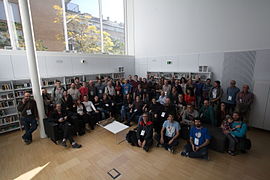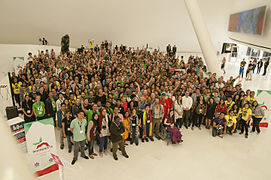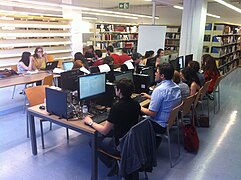Grants:APG/Proposals/2014-2015 round1/Amical Wikimedia/Impact report form
Purpose of the report
[edit]This form is for organizations receiving Annual Plan Grants to report on their results to date. For progress reports, the time period for this report will the first 6 months of each grant (e.g. 1 January - 30 June of the current year). For impact reports, the time period for this report will be the full 12 months of this grant, including the period already reported on in the progress report (e.g. 1 January - 31 December of the current year). This form includes four sections, addressing global metrics, program stories, financial information, and compliance. Please contact APG/FDC staff if you have questions about this form, or concerns submitting it by the deadline. After submitting the form, organizations will also meet with APG staff to discuss their progress.
Global metrics overview - all programs
[edit]'We are trying to understand the overall outcomes of the work being funded across our grantees' programs. Please use the table below to let us know how your programs contributed to the Global Metrics. We understand not all Global Metrics will be relevant for all programs, so feel free to put "0" where necessary. For each program include the following table and
- Next to each required metric, list the outcome achieved for all of your programs included in your proposal.
- Where necessary, explain the context behind your outcome.
- In addition to the Global Metrics as measures of success for your programs, there is another table format in which you may report on any OTHER relevant measures of your programs success
For more information and a sample, see Global Metrics.
- Program Community
| Metric | Achieved outcome | Explanation |
| 1. # of active editors involved | 205 | program details |
| 2. # of new editors | n/a | program details |
| 3. # of individuals involved | 10,279 | program details |
| 4. # of new images/media added to Wikimedia articles/pages | n/a | program details |
| 5. # of articles added or improved on Wikimedia projects | n/a | program details |
| 6. Absolute value of bytes added to or deleted from Wikimedia projects | n/a | program details |
- Detailed & expanded version of these metrics available here
- Program GLAM
| Metric | Achieved outcome | Explanation |
| 1. # of active editors involved | 585 | program details |
| 2. # of new editors | 419 | program details |
| 3. # of individuals involved | 3,088 | program details |
| 4. # of new images/media added to Wikimedia articles/pages | 1,946 | program details |
| 5. # of articles added or improved on Wikimedia projects | 1,468 | program details |
| 6. Absolute value of bytes added to or deleted from Wikimedia projects | n/a | program details |
- Detailed & expanded version of these metrics available here
- Program Education
| Metric | Achieved outcome | Explanation |
| 1. # of active editors involved | 764 | program details |
| 2. # of new editors | 756 | program details |
| 3. # of individuals involved | 2,315 | program details |
| 4. # of new images/media added to Wikimedia articles/pages | 621 | program details |
| 5. # of articles added or improved on Wikimedia projects | 2,371 | program details |
| 6. Absolute value of bytes added to or deleted from Wikimedia projects | n/a | program details |
- Detailed & expanded version of these metrics available here
- Program Community suggested innovation and other partnerships
| Metric | Achieved outcome | Explanation |
| 1. # of active editors involved | 512 | program details |
| 2. # of new editors | 206 | program details |
| 3. # of individuals involved | 1,493 | program details |
| 4. # of new images/media added to Wikimedia articles/pages | 4,075 | program details |
| 5. # of articles added or improved on Wikimedia projects | 13,213 | program details |
| 6. Absolute value of bytes added to or deleted from Wikimedia projects | n/a | program details |
- Detailed & expanded version of these metrics available here
- Comment on bytes added: We haven't reported this metric due to several reasons:
- a) We don't really feel this metric is a good tool to evaluate the progress of a project.
- b) We cannot know which editions come from a project and which ones don't in a busy article or enviroment, since not everyone sign up for the wikiproject list. We could add all the bytes related to one topic or edited in an specific time slice, but it wouldn't be an appropiate picture of reality.
- c) We think it's impossible to count every byte equally. It's not the same when you add content, when you correct typos or when you edit wikidata.
|}
Telling your program stories - all programs
[edit]Please tell the story of each of your programs included in your proposal. This is your chance to tell your story by using any additional metrics (beyond global metrics) that are relevant to your context, beyond the global metrics above. You should be reporting against the targets you set at the beginning of the year throughout the year. We have provided a template here below for you to report against your targets, but you are welcome to include this information in another way. Also, if you decided not to do a program that was included in your proposal or added a program not in the proposal, please explain this change. More resources for storytelling are at the end of this form. Here are some ways to tell your story.
- We encourage you to share your successes and failures and what you are learning. Please also share why are these successes, failures, or learnings are important in your context. Reference learning patterns or other documentation.
- Make clear connections between your offline activities and online results, as applicable. For example, explain how your education program activities is leading to quality content on Wikipedia.
- We encourage you to tell your story in different ways by using videos, sound files, images (photos and infographics, e.g.), compelling quotes, and by linking directly to work you produce. You may highlight outcomes, learning, or metrics this way.
- We encourage you to continue using dashboards, progress bars, and scorecards that you have used to illustrate your progress in the past, and to report consistently over time.
- You are welcome to use the table below to report on any metrics or measures relevant to your program. These may or may not include the global metrics you put in the overview section above. You can also share your progress in another way if you do not find a table like this useful.
Program "Community care"
[edit]- Community care program in pictures
-
Viquitrobada 2015 Record of attendance!
-
User:Davidpar interviewed to Community champions
-
2 Amical members were granted to attend Lyon Hackathon 2015
-
Wikimania 2015 Amical grants were declared null
| Target | Last year (if applicable) | Progress (end of year) | Comments | ||
|---|---|---|---|---|---|
| Organising Viquitrobada 2015, Catalan Wikimedians AGM | 2014 edition |
|
2015 edition: We had our most succeed viquitrobada so far >100 attendees, media coverage, great programme & guest speakers and Venue for free. It was not Amical's AGM but community's AGM. | ||
| 2 formative seminars for Wikimedians | Test done during Viquitrobada 2014 |
|
We organised workshops for experienced Wikimedians on how to give Wikimedia workshops to newbies. | ||
| Interviews | 2014: [1], [2] [3], [4] and many more. |
|
Interviews/reports/posts: [5], [6], [7], [8], [9], [10], [11], [12], [13], [14], [15] | ||
| Following each volunteer driven activity | n/a |
|
We've been following all volunteer proposals so far this year | ||
| Community grants | London 2014 |
|
We've funded 2 grants for Hackathon Lyon 2015. None to Wikimania 2015 due to lack of user quality proposals |
| Successes (so far) | Failures (so far) | Learnings (so far) |
|---|---|---|
|
|
|
GLAM program
[edit]- GLAM program in pictures
-
Amical reached >150 active libraries on Wikipedia and shared our model with communities in Italy, Spain, the Netherlands, United Kingdom & USA)
-
We received some content donations: from food pictures to Catalan sports dictionnaires or Egyptian statues
-
We've copied the libraries model and started with Catalan archives
-
3 Wikipedians in Residence at the same GLAM
| Target | Last year (if applicable) | Progress (end of year) | Comments | ||
|---|---|---|---|---|---|
| Active GLAMwiki libraries | 100 (2014) |
|
Case study. We will try to stop growing the rest of the year and improve quality & depth of activities. | ||
| Reaching 10 new GLAM | 2014 |
|
Starting collaboration with the network of Catalan Archives. | ||
| 10 new libraries self organized | 2014 |
|
Catalan Libraries self-organize several edit-a-thons and workshops: [16], their own writing challenges or Wiki Takes events | ||
| 5 museums or GLAMs using the Wikipedian in Residence model | 2014 |
|
WiR residence is being rethought among community members. Although some GLAMs are looking fwd to it, community members prefer a midterm collaboration rather than a formal real life commitment. We have detected that in some areas, like the Land of Valencia, the model is still attractive to both GLAM and community members and will go for it during 2016. | ||
| 10 commited libraries will test a "small sister" libraries project, where the experienced library will be helping new glamwiki librarians getting into wiki universe. | n/a | n/a | Program is ongoing, but unofficially. The reason is that it can't be formally implemented due to difficulties to establish legal responsabilities between local admins. Although it is happening as an informal network. |
| Successes (so far) | Failures (so far) | Learnings (so far) |
|---|---|---|
|
|
|
Education Program
[edit]- Education program in pictures
-
We extended our program to new Universities
-
Teachers and students together on a library science edit-a-thon managed by a university library
-
Teachers and students joined our Music Day Wikifest
-
WikiArs new content and new exhibits ongoing
| Target | Last year (if applicable) | Progress (end of year) | Comments | ||
|---|---|---|---|---|---|
| Having an ongoing eduwiki project in at least 75% of the Universities of the Vives Network | 2014 |
|
Projects done course 2014-2015 and 2015-2016. | ||
| 30 university classrooms | 2014 |
|
Projects done course 2014-2015 and 2015-2016. | ||
| Collecting specific feedback on our portal | Catalan Wiki Education Portal |
|
We did interviewed teachers and lively improved portal with their comments. We also have a steering commitee in some Universities to evaluate every semester our wiki efforts and improve our documentation. |
| Successes (so far) | Failures (so far) | Learnings (so far) |
|---|---|---|
|
|
|
| 07-08 | 08-09 | 09-10 | 10-11 | 11-12 | 12-13 | 13-14 | 14-15 | 15-16 |
|---|---|---|---|---|---|---|---|---|
| 3 | 1 | 3 | 4 | 7 | 13 | 38 | 46 | 28* |
- Note: 2015-2016 educational projects, although started in Oct 2015, are not included in this report as they end in Feb 2016. We have included some of them which actually finished during 2015.
Program "Community suggested, other partnerships and innovation projects"
[edit]- Community suggested, other partnerships and innovation projects in pictures
-
Wiki Loves Earth 2015 in Catalan Areas
-
Community project to reach 500K articles milestone in 2015
-
"Wikipedia Day" on major Catalan Public Radio (Catalunya Ràdio) with a 12 h editathon & coverage in every program during the whole day
-
Promoting online contests for multilingualism, improving languages of Wikipedia or covering local Comic Con
| Target | Last year (if applicable) | Progress (end of year) | Comments | ||
|---|---|---|---|---|---|
| Wiki Loves Earth 2015 | [17] |
|
WLE results 2015 | ||
| Wiki Loves Monuments 2015 | [18] |
|
We did a writing contest related to Catalan monuments, like in 2014. | ||
| "Navega en català" project | 2014 |
|
We didn't get to an agreement with other partner organizations. | ||
| 1 international challenge with editors from as many wikis as possible | Catalan culture challenge 2014 |
|
We did 288 Wikipedia languages wikiproject and Saint George Wikiproject, explained further below. |
| Successes (so far) | Failures (so far) | Learnings (so far) |
|---|---|---|
|
|
|
Revenues received during this period (12 months for impact report)
[edit]Please use the exchange rate in your APG proposal.
Table 2 Please report all spending in the currency of your grant unless US$ is requested.
- Please also include any in-kind contributions or resources that you have received in this revenues table. This might include donated office space, services, prizes, food, etc. If you are to provide a monetary equivalent (e.g. $500 for food from Organization X for service Y), please include it in this table. Otherwise, please highlight the contribution, as well as the name of the partner, in the notes section.
Revenue source Currency Anticipated Q1 Q2 Q3 Q4 Cumulative Anticipated ($US)* Cumulative ($US)* Explanation of variances from plan Revenue source Currency Anticipated Q1 Q2 Q3 Q4 Cumulative Anticipated (USD) Cumulative USD Explanation of variances from plan Membership fees + donations EUR 2.500,00 € 952,00 € 3.223,08 € 4.175,08 € 3.282,50 USD 5.481,88 USD Memberships fees in 3Q Grant EUR 82.100,66 € 47.892,00 € 34.209,00 € 82.101,00 € 107.798,17 USD 107.798,61 USD Other revenues EUR 9.500,00 € 4.084,47 € 6.170,00 € 10.254,47 € 12.473,50 USD 13.464,12 USD Total EUR 94.100,66 € 52.928,47 € 43.602,08 € 96.530,55 € 123.554,17 USD 126.744,61 USD
* Provide estimates in US Dollars
Euro/USD 1,313 the exchange rate in our APG proposal
Spending during this period (12 months for impact report)
[edit]Please use the exchange rate in your APG proposal.
Table 3 Please report all spending in the currency of your grant unless US$ is requested.
- (The "budgeted" amount is the total planned for the year as submitted in your proposal form or your revised plan, and the "cumulative" column refers to the total spent to date this year. The "percentage spent to date" is the ratio of the cumulative amount spent over the budgeted amount.)
Expense Currency Budgeted Q1 Q2 Q3 Q4 Cumulative Budgeted ($US)* Cumulative ($US)* Percentage spent to date Explanation of variances from plan Expense Currency Budgeted Q1 Q2 Q3 Q4 Cumulative Budgeted USD Cumulative USD Percentage spent to date Explanation of variances from plan Program 1: Community EUR 12.000,00 € 4.717,59 € 4.308,10 € 9.025,69 € 15.756,00 USD 11.850,73 USD 75,21% Program 2: GLAM EUR 34.550,33 € 17.424,70 € 16.975,32 € 34.400,02 € 45.364,58 USD 45.167,23 USD 99,56% Program 3: Education EUR 34.550,33 € 14.866,52 € 13.345,12 € 28.211,64 € 45.364,58 USD 37.041,88 USD 81,65% Program 4: Other partnerships EUR 13.000,00 € 1.378,92 € 5.133,01 € 6.511,93 € 17.069,00 USD 8.550,16 USD 50,09% * Money from WLE awards was kindly donated by a project partner Total EUR 94.100,66 € 38.387,73 € 39.761,55 € 78.149,28 € 123.554,17 USD 102.610,00 USD 83,05%
* Provide estimates in US Dollars
Euro/USD 1,313 the exchange rate in our APG proposal
Compliance
[edit]Is your organization compliant with the terms outlined in the grant agreement?
[edit]As required in the grant agreement, please report any deviations from your grant proposal here. Note that, among other things, any changes must be consistent with our WMF mission, must be for charitable purposes as defined in the grant agreement, and must otherwise comply with the grant agreement.
Are you in compliance with all applicable laws and regulations as outlined in the grant agreement? Please answer "Yes" or "No".
- YES
Are you in compliance with provisions of the United States Internal Revenue Code (“Code”), and with relevant tax laws and regulations restricting the use of the Grant funds as outlined in the grant agreement? Please answer "Yes" or "No".
- YES
Signature
[edit]- Once complete, please sign below with the usual four tildes.
Resources
[edit]Resources to plan for measurement
[edit]- Global metrics are an important starting point for grantees when it comes to measuring programmatic impact (Learning Patterns and Tutorial) but don’t stop there.
- Logic Models provide a framework for mapping your pathway to impact through the cause and effect chain from inputs to outputs to outcomes. Develop a logic model to map out your theory of change and determine the metrics and measures for your programs.
- Importantly, both qualitative and quantitative measures are important so consider both as you determine measures for your evaluation and be sure to ask the right questions to be sure to capture your program stories.
Resources for storytelling
[edit]- WMF storytelling series and toolkit (DRAFT)
- Online workshop on Storytelling. By Frameworks institute
- The origin of storytelling
- Story frames, with a focus on news-worthiness.
- Reading guide: Storytelling and Social change. By Working Narratives
- The uses of the story.
- Case studies.
- Blog: 3 Tips on telling stories that move people to action. By Paul VanDeCarr (Working Narratives), on Philanthropy.com
- Building bridges using narrative techniques. By Sparknow.net
- Differences between a report and a story
- Question guides and exercises.
- Guide: Tools for Knowledge and Learning. By Overseas Development Institute (UK).
- Developing a strategy
- Collaboration mechanisms
- Knowledge sharing and learning
- Capturing and storing knowledge.
















